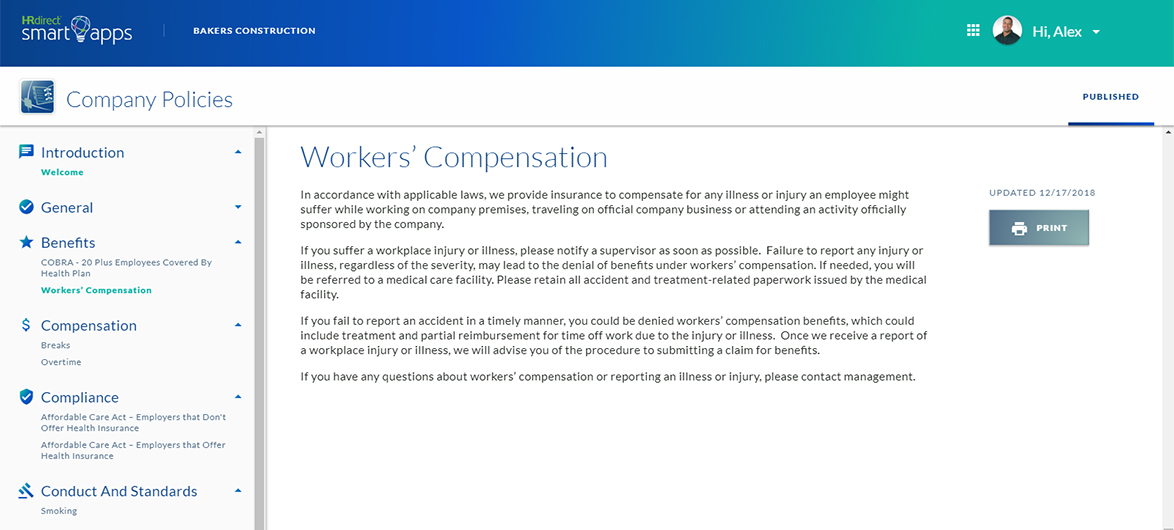Whether you have a large or small business, defining your company policies can help build a better working environment for your employees and prevent misunderstandings that lead to problems. Putting your company policies in writing — and being upfront with your employees about acceptable and unacceptable behavior — sets the stage for success, too.
Clearly stated, policies for small business can protect you legally, as long as you uphold them, apply them consistently for all employees and stay within the boundaries of current employment law.
Some key areas that company policies may cover include:
- Employee behavior and conduct, such as attendance, cell phone use, social media and email use, dating in the workplace, dress codes, use of company property for personal reasons, sexual harassment, etc.
- Processes or procedures, such as submitting travel expenses, applying for time off, requesting equipment or supplies, or filing a complaint
- Compliance with laws and benefits such as Paid Time Off (PTO), Family and Medical Leave, COBRA, data storage and confidentiality laws
- Disaster or emergency procedures, security procedures or handling a crisis
- Disciplinary issues or fair treatment of employees

Getting Started with Policy Development
Keep in mind you don’t need to create a policy for every possible situation. Doing so could limit your ability to address individual employee needs or situations in the best way. Policies should, however, provide a good set of guidelines for how your company operates and help establish fair and consistent treatment for all employees.
A good place to start is with an audit of existing company policies (whether written or not). All policies should be current with the latest federal and state laws. For example, does your social media policy consider National Labor Relations Board (NLRB) rules that allow employees to address work conditions on Facebook, Twitter and other media? Then consider any current problems or issues with employee behavior you need to address. Is excessive absenteeism a concern? Are employees reporting hostile treatment or harassment from coworkers? Have you noticed too much personal use of social media during the workday? You may wish to create policies to address these specific issues.
Next, look at whether you have policies in place to address all workplace laws and regulatory issues, such as privacy and confidentiality of data, workplace safety under OSHA, equal opportunity employment and COBRA. Also take a look at how your company handles the following issues, and whether they should be addressed with a formal policy:
- technology (email, text messaging, blogs and mobile phones)
- situations (vacations, crisis, events and holidays)
- behaviors (ethics, hiring, sexual harassment, etc.)
Steps to Creating Effective Company Policies
After determining the policies you require, you’ll need to figure out the content to include.
Establishing a standard structure will help you create consistent and easy-to-understand policies. A template can help you organize your policy into clear sections and save you time, as well. Your template should include:
- Header. On your template, include a placeholder for the policy name or title, the effective dates, revision dates or versions, approvals, and the person or department who created it.
- Purpose. This section is for a description of what the policy is about and why it’s being created.
- Policy description. Here you will outline the details of the policy and to whom it applies.
- Implementation. This section covers how the policy will be enforced and the consequences or next steps regarding infractions.
- Procedures. Include instructions for implementing the policy and directions for employees on how to report an incident.

Guidelines for Writing Effective Policies
It’s important to write company policies in clear, easy-to-understand language, being careful to avoid confusing legal jargon.
Be sure to include a statement in your handbook regarding at-will employment (such as, “Either the Company or the employee can terminate the employment relationship at any time, with or without cause”) — and steer clear of language that might insinuate that adhering to the policy ensures continued employment.
Providing a clear and specific outline of expectations is critical. For example, if you are writing an email policy, avoid saying employees are allowed “limited” or “appropriate” use of personal email. What your employee considers appropriate and what you have in mind may be different.
Instead, spell out, for example, that employees are allowed to engage in personal email use only during breaks or after business hours. Or, clarify that personal email usage is OK as long as it doesn’t interfere with job performance and no confidential company information is shared.
If your company is monitoring employee email use, inform employees that any personal email sent using company property is excluded from expectations of privacy and may be retained on company servers along with business email. You may want to remind employees that they should never put in writing anything that will come back to haunt them, embarrass their family or friends, or harm the company.

After developing a policy, get feedback from the managers or people responsible for implementing the policy. It’s best practice to have a lawyer review the policy to ensure compliance and avoid any potential legal problems.
Get Help Creating Appropriate, Compliant Company Policies
Ensuring that your company policies are effective, appropriately worded and well within the boundaries of state and federal laws can be intimidating. The Company Policies Smart App is a practical tool that can help you get and stay in compliance. You can be confident you’re not overlooking important legal issues because the app provides a library of state-specific policies that are updated as laws change. Plus, the attorney-written policy templates are easy to publish and distribute to employees, including a tracking feature as policies are viewed.
- Fair and consistent treatment of all employees
- Legal protection for your company
- Clear expectations that employees can follow
- Organized approach to uncertain situations, problems or crisis






